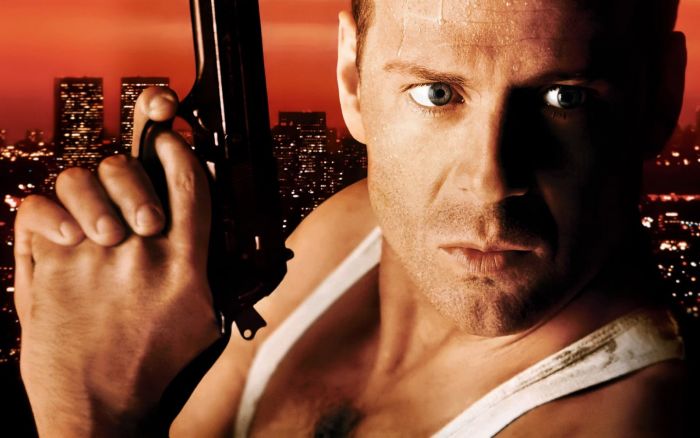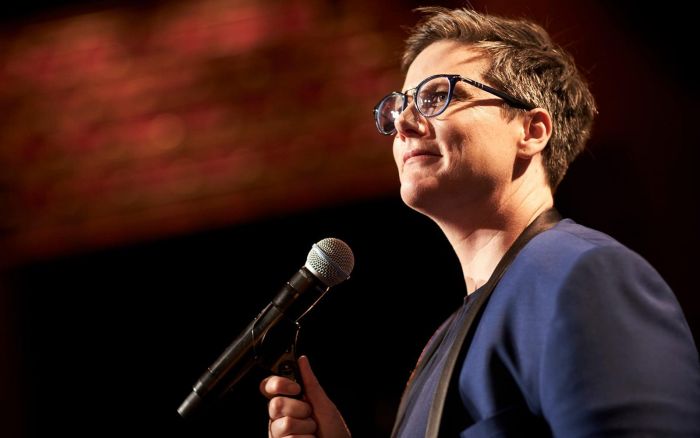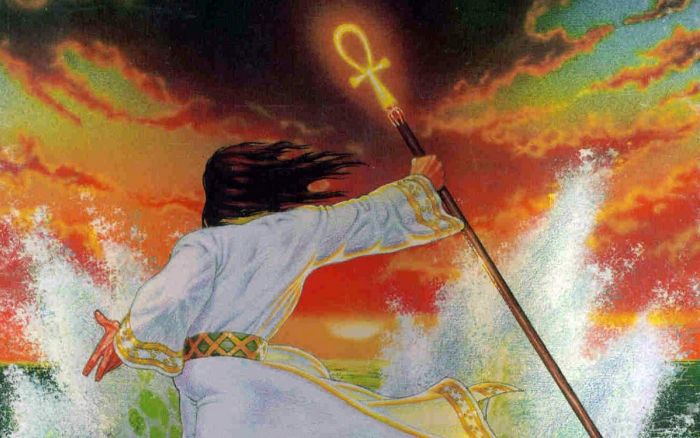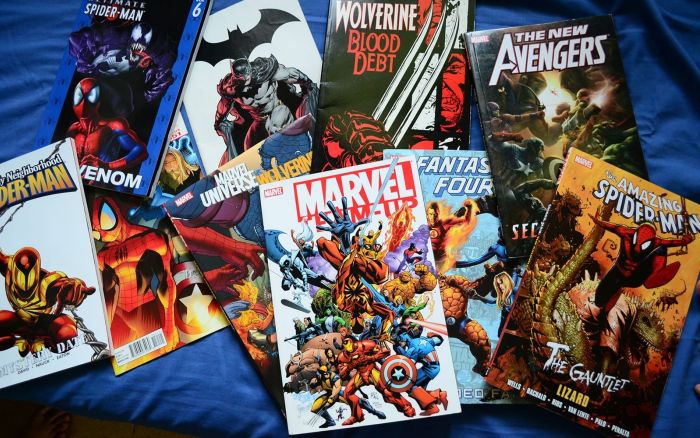Weekend Reads: Die Hard Turns 30, Hannah Gadsby, Floppy Disk Albums, Luke Skywalker, the World Cup & more

It may be 30 years old, but Die Hard remains the quintessential American action movie. “There’s not a wasted moment in Die Hard, not a moment when the audience feels confused about who’s who or what’s going on or where the characters are in relation to each other. It seems like simplest, most banal part of a making a movie, but it must be the hardest, because the vast majority of actioners, even good ones, don’t succeed in doing it.”
And speaking films that have aged well, Stanley Kubrick’s 2001 still astounds at 50, especially after a new Christopher Nolan-supervised restoration. “[F]rom the dawn of man to the dawn of the star child, this tale of human advancement nudged along by black boxes from outer space endures as a monument to monumental filmmaking not because it’s asking big questions or positing big answers, but because it just looks so damn good on the big screen.” (Via Prufrock.)

With her acclaimed Netflix special Nanette, Hannah Gadsby represents the future of stand-up comedy. “Gadsby takes us on a guided tour of a range of human experiences, along with a Socratic discourse on the essence of comedy and storytelling, their role in liberating individuals and reinforcing social norms, and the falseness (as she sees it) of ‘separating the art from the artist’ when the art is always informed by the artist’s personality, life experience, and moral code or lack thereof.”
The Cold War documentary The Atomic Cafe has received a 4K restoration. “Here’s a bit of history about the seminal doc. Directed and released in 1982 by Jayne Loader, Kevin Rafferty, and Pierce Rafferty, ‘The Atomic Cafe’ is a cult classic documentary juxtaposing the history of the Cold War, propaganda, music and culture of the time. More recently, the film’s new 4K restoration was an Official Selection at the SXSW 2018 Film Festival.” Related: The Opus review of The Atomic Cafe.

The classic Ultima video games challenged its players to think morally. “1985’s Ultima IV… was the game that I fell in love with, because it went so much against the grain of a traditional RPG. There weren’t villains you had to vanquish or an evil that had to be defeated. Your main goal was to be a good person and go throughout Britannia helping people. 1988’s Ultima V flipped morality on its head by pushing the virtues of the avatar into a moral absolutism that was terrifying. Further games in the series would push the boundaries of ethics, forcing players to question the binary values they’d normally associate with simpler gaming narratives.”
The influence of Akira stretches throughout science fiction and pop culture. “It’s become a text almost as revered as its predecessors, referred to in pretty much any film featuring a telekinetic child or future dystopia. The final act almost acts as a treatise on the film itself, a ground-shaking work that launched sci-fi into a new order, while reflecting on the past.”

A recent Twitter thread explains why some Star Wars fans have fundamentally misunderstood Luke Skywalker’s depiction in The Last Jedi. “It’s funny that fans don’t understand this, because throughout this entire franchise, Jedi have almost annoyingly touted themselves as arbiters of peace. They value non-violence. They’re more monks than soldiers — which is what Luke realized in his final confrontation with Vader and the emperor.” Related: The Opus review of Star Wars: The Last Jedi.
Marvel’s latest film, Ant-Man and the Wasp, is less epic than most comic book movies, and that’s why it’s so successful. “In theory, this should make Ant-Man and the Wasp underwhelming. But as it turns out, the movie is actually a blessed relief. If anything, we could use more action movies with its relative chill… [B]oth the 2015 original and the new sequel sport a self-effacing tone that basically acknowledges, ‘Hey, we know we’re not your first choice for a Marvel movie. But we promise we’ll be fun.’ ”

Speaking of Ant-Man and the Wasp, K. B. Hoyle celebrates its focus on families. “Scott recognizes that family is good, and not just his family. If he insisted on his family first, he would turn into a character like the Vulture, but he doesn’t. In perhaps an eerily prescient move for this day and time in America, Marvel reveals the importance of intact families — wherever we might find them.”
David Crow argues that The Dark Knight is still the best superhero movie of all time. “[W]hat made it more than just a big opening weekend or another superhero movie to fade from memory six months later is that The Dark Knight is a nigh perfect superhero passion play, one aiming to throw its winged crusader into a rarified air that most other action movie franchises simply avoid.”

The comic book industry is doing just fine but some still persist in proclaiming its demise. “No matter how many metrics and how much anecdotal evidence shows that things are looking up, there’s a persistent undercurrent in comics fandom that seems to want things to go down. Every new storyline is lambasted. (‘It’s just a gimmick!’) Every new publishing initiative is criticized. (‘You’re disrespecting the real fans!’) Every single store closing is met with a strange schadenfreude. (‘See? I told you it was all going to hell!’) And it’s been this way for years.”
John Simon calls Ingmar Bergman the greatest filmmaker of all time, and more people should know about him. “Many of Bergman’s films received wide critical acclaim, and even his lesser achievements became objects of fascination and admiration during his lifetime. Whole new modes of filmmaking derived from Bergman, and the vast number of commentators on his works is very nearly equaled by those influenced by him, whether or not they know it. But the passage of time, the evolution of tastes, and our cultural emphasis on the new has meant that today’s young American moviegoers are unfamiliar with the Swedish filmmaker’s work.” (Via Prufrock.)

Forget about vinyl. The really cool kids want their music on 3.5″ floppy disks. “Beyond the obvious nostalgia factor, the floppy is a natural fit for vaporwave, music that is often lo-fi even before it’s compressed down to fit into such a tiny space. ‘One floppy holds 1.44 megabytes of data. So, the most I’ve been able to fit on one was three songs,’ says Sea of Clouds’ Maftei. ‘They were compressed to hell, but still very listenable. I listened to them from the floppy and I couldn’t complain. It sounds good enough.’ ”
What’s it like using a nearly thirty-year-old computer? “To its credit, however, the IIsi was able to get me to where I wanted to go, whether it was a spot of writing, listening to music (kind of), checking emails, unwinding with a classic computer game, or browsing the World Wide Web. The more I interacted with the IIsi, the more I remembered what it was like to enjoy using a computer — to appreciate their capabilities as tools of business and leisure.” My uncle had a IIsi ages ago and I thought it was the coolest thing. (Via Michael Tsai.)

Though they didn’t win, England’s performance was one of the great stories in this year’s World Cup. “Could Gareth Southgate’s twenty-three men, having won the hearts of the nation, show a divided country how to unite? The answer, of course, is no. But the England squad can claim a more modest achievement: to have shown that football doesn’t have to be as crass, superficial, and exploitative as it sometimes appears.”
The 2018 World Cup offered Americans a lesson in humility. “From the United States’ absence to the final battle for the title, this year’s World Cup reminds us that America is not universally synonymous with greatness. On the contrary, success this year was fueled by grit, teamwork, grassroots passion for the sport, and a diversity created through immigration — all things worth rooting for.”